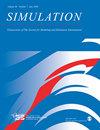Numerically robust co-simulation using transmission line modeling and the Functional Mock-up Interface
IF 2
4区 工程技术
Q4 COMPUTER SCIENCE, INTERDISCIPLINARY APPLICATIONS
Simulation-Transactions of the Society for Modeling and Simulation International
Pub Date : 2022-05-08
DOI:10.1177/00375497221097128
引用次数: 1
Abstract
Modeling and simulation are important tools for efficient product development. There is a growing need for collaboration, interdisciplinary simulation, and re-usability of simulation models. This usually requires simulation tools to be coupled together for co-simulation. However, the usefulness of co-simulation is often limited by poor performance and numerical instability. Achieving stability is especially hard for stiff mechanical couplings. A suitable method is to use transmission line modeling (TLM), which separates submodels using physically motivated time delays. The most established standard for tool coupling today is the Functional Mock-up Interface (FMI). Two example models in one dimension and three dimensions are used to demonstrate how the next version of FMI for co-simulation can be used in conjunction with TLM. The stability properties of TLM are also proven by numerical analysis. Results show that numerical stability can be ensured without compromising on performance. With the current FMI standard, this requires tailor-made models and custom solutions for the interpolation of input variables. Without using custom solutions, variables must be exchanged using sampled communication and extrapolation. In this case, stability properties can be improved by reducing communication step size. However, it is shown that stability cannot be achieved even when using unacceptably small communication steps. This motivates the need for the next version of FMI to include an intermediate update mode, where variables can be interchanged in between communication points. It is suggested that the FMI standard should be extended with optional callback functions for providing intermediate output variables and requesting intermediate input variables.采用传输线建模和功能模型接口的数值鲁棒联合仿真
建模和仿真是高效产品开发的重要工具。对协作、跨学科仿真和仿真模型的可重用性的需求日益增长。这通常需要仿真工具耦合在一起进行联合仿真。然而,联合模拟的实用性往往受到性能差和数值不稳定性的限制。对于刚性机械联轴器来说,实现稳定性尤其困难。一种合适的方法是使用传输线建模(TLM),它使用物理驱动的时间延迟来分离子模型。目前最成熟的工具耦合标准是功能模拟接口(Functional Mock-up Interface, FMI)。使用一维和三维的两个示例模型来演示如何将下一个版本的FMI与TLM结合起来进行联合仿真。通过数值分析证明了TLM的稳定性。结果表明,在不影响性能的情况下,可以保证数值稳定性。使用当前的FMI标准,这需要为输入变量的插值定制模型和定制解决方案。如果不使用自定义解决方案,则必须使用抽样通信和外推来交换变量。在这种情况下,可以通过减少通信步长来改善稳定性。然而,即使使用令人难以接受的小通信步骤,也无法实现稳定性。这促使FMI的下一个版本需要包含一个中间更新模式,其中变量可以在通信点之间交换。建议将FMI标准扩展为可选的回调函数,以提供中间输出变量和请求中间输入变量。
本文章由计算机程序翻译,如有差异,请以英文原文为准。
求助全文
约1分钟内获得全文
求助全文
来源期刊
CiteScore
3.50
自引率
31.20%
发文量
60
审稿时长
3 months
期刊介绍:
SIMULATION is a peer-reviewed journal, which covers subjects including the modelling and simulation of: computer networking and communications, high performance computers, real-time systems, mobile and intelligent agents, simulation software, and language design, system engineering and design, aerospace, traffic systems, microelectronics, robotics, mechatronics, and air traffic and chemistry, physics, biology, medicine, biomedicine, sociology, and cognition.

 求助内容:
求助内容: 应助结果提醒方式:
应助结果提醒方式:


